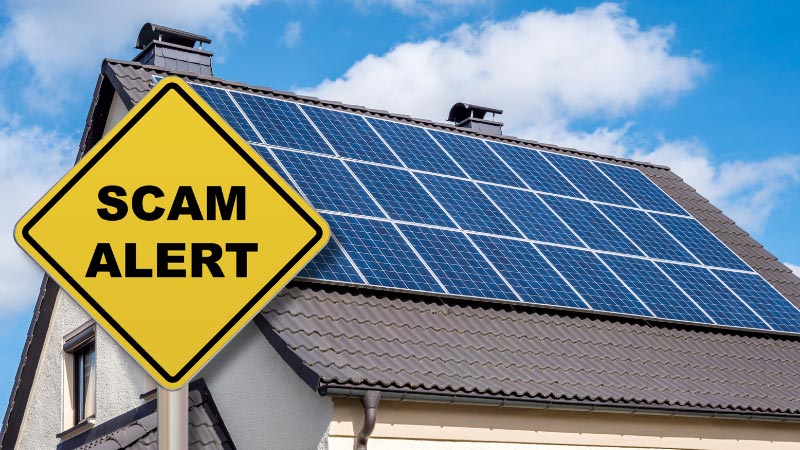The home solar market is growing with speed right now. Across the United States, electricity rates are skyrocketing. In addition, the federal solar tax credit has also increased it’s credits from 26% to 30% until 2032. It has been anticipated the solar panel incentives will increase solar installations by 21%. This highlights an often overlooked point – increased number of solar scams.
Initiatives regarding solar energy system installations have also led to an increased number of complaint against solar company. While there’s nothing to worry about the licensed solar companies, there are many who might not be. Some solar installers resort to unethical methods to persuade you into making significant investments, which is where the concern lies.
If you’re considering switching to solar power, be cautious of offers that appear too good to be true. Read this article to learn about some commonly faced scams and how to identify warning signs and stay vigilant against potential solar company scams.
Watch Out for Common Solar System Scams
As the solar industry gets more competitive, there are more scams related to solar panels. Let’s look at some common scams to be careful of.
Fake Solar Companies: Some scams involve making up a fake company and selling solar panels without planning to install them. They might ask for advance payments and then go poof without doing any work.
Identity Theft Scams: Scammers pretending to be solar representatives might ask you to fill out fake solar forms. They could use this to steal your personal information and commit identity theft.
Solar Lease or Power Purchase Agreement (PPA) Scams: Solar leases and PPAs aren’t always scams, but they can be tough to get out of. You might end up with a monthly payment for solar panels you don’t even own. Always understand the terms before agreeing to these contracts.
Tricky Contracts: Dishonest solar companies might put solar panels on your home but give you contracts that charge too much or let the company avoid fixing problems with your system.
Protecting yourself from these scams can help you keep your money safe and avoid being tricked.
7 Ways to Protect Yourself From Solar System Scams
Here we have enlisted some points to keep in mind when dealing with a solar panel installation company.
1. Avoid Sharing Banking or Financial Details Initially
Scammer companies may request your credit information upfront. Please do not provide financial details solely for obtaining a solar quote. In the unfortunate event that a company is operating fraudulently, your financial data could be misused for unlawful purposes.
Nevertheless, there could be situations where sharing financial details becomes appropriate. Once you’ve checked prices and are really thinking about getting solar panels, and you are certain about the company’s authenticity, then you can proceed with the further steps of finalizing solar installation.
2. Conduct Research on Potential Installers
Prior to reaching out for a quote, take the time to gather information about potential solar installers. If you know individuals who have already installed solar panels—whether friends, coworkers, neighbors, or family members—engage with them to learn about their experience. If a solar company initiates contact with you, make sure to assess its credibility by consulting the Better Business Bureau (BBB) and reviewing online feedback.
Avoid making quick decisions; instead, prioritize obtaining multiple quotes. Compare various factors such as warranties, product offerings, and system sizes to make an informed choice that suits your needs.
3. Pose the Right Questions
Before you make up your mind, make sure to have a set of questions ready to ask the solar companies. These questions can cover practical matters like how long the installation will take, the needed permits, connecting to your utilities, and the system’s design or technical details about the products and their warranties. Also, it’s crucial to understand the monetary aspects involved. This includes leasing, Power Purchase Agreements (PPA), loan choices, and the terms of payment.
4. Get a Price Estimate Before Making a Decision
Before you finalize anything, ensure you have a price estimate in written form. This estimate should include all the things the salesperson discussed with you, such as payment terms, details about the solar equipment, warranty duration, the system’s size, and when the installation is scheduled. In most cases, solar installers handle the required permits and the connection process with your local power company.
5. Sign Only Safe Documents
Sometimes, dishonest companies might tell you that you’re just signing to check if you can get financing or incentives for solar panels. But be cautious: scammers might use your electronic signature for other things. So, it’s better to only sign documents sent through secure programs like DocuSign. This can help stop this kind of problem.
6. Compare Offers from Different Companies
Just like any big home improvement project, it’s a smart idea to get quotes from a few different companies. But remember, the cheapest option might not always be the best in the long run.
When you’re looking at solar quotes:
- Check the sizes of the systems they suggest. A home solar system’s size is measured in kilowatts (kW), which is 1,000 watts.
- Look at the cost for each watt in the system. You can find this by dividing the total cost by the system’s wattage. For example, if a 5 kW (5,000 watts) solar system costs $15,000, it’s $15,000 divided by 5,000 = $3 per watt.
- Know the brands of the parts they’ll use, like the solar panels, inverter, and batteries. Some offers might include better-quality parts that produce more energy over time.
- Understand what kind of warranties they offer for labor, equipment, and performance for each solar quote.
7. Understand Your Incentives: Federal, State, and Local
Before talking to a solar salesperson, it’s a good idea to learn about programs that offer rewards for using renewable energy. The federal solar tax credit, for example, is available at 30% until 2032, but you need to have enough tax liability to use it. To know if you’re eligible, talk to a tax expert.
Remember, incentive program rules can change. Some programs last only until the money runs out. Solar companies usually don’t include incentives in their prices, so if you don’t qualify or the program ends, you’ll still know the cost. A solar company that knows its stuff can help you understand what incentives are available for you.
Conclusion
Since the mid-2010s, solar energy has been getting more popular. Many states are encouraging clean energy by giving out rewards and plans to cut costs. Lots of homeowners across the country are saving money on energy bills with these renewable energy ideas. Sadly, just like with anything that’s getting popular, there are people who want to trick you. But if you follow the advice in this guide, you’ll know more about common solar system scams and how to stay away from them.
However, if you find yourself in such a situation, it’s important to take action. Immediately file a complaint against the solar installers. This step will help you protect your rights and seek the necessary resolution. Don’t hesitate to reach out and voice your concerns if you suspect any wrongdoing or fraudulent behavior.



